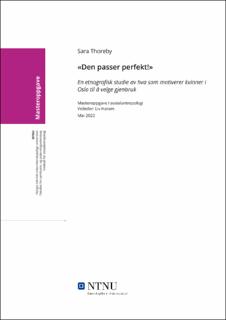| dc.contributor.advisor | Haram, Liv | |
| dc.contributor.author | Thoreby, Sara | |
| dc.date.accessioned | 2022-07-27T17:19:42Z | |
| dc.date.available | 2022-07-27T17:19:42Z | |
| dc.date.issued | 2022 | |
| dc.identifier | no.ntnu:inspera:108359213:11251963 | |
| dc.identifier.uri | https://hdl.handle.net/11250/3008930 | |
| dc.description.abstract | Basert på antropologisk feltarbeid i dagens forbrukersamfunn i Oslo, har forbrukeren mulighet til å velge å handle gjenbruk. Denne avhandlingen forsøker å belyse motivasjonsgrunnlaget til et utvalg kvinner i dagens Oslo som alle velger gjenbruk. Det er variasjon i kvinnenes motivasjon, men de fleste informantene motiveres av økonomi og egen interesse. I tillegg er informantene motivert av stil, sosialitet og klima. Det er også hindringer som taler i mot gjenbruk. Noen av disse er hygiene, smak, tidsbruken det krever å handle gjenbruk, og økonomi, der økonomi både er en motivasjon og en hindring. I tillegg til å beskrive handling av gjenbruk på bruktbutikker, beskriver jeg hva som forgår på en privatorganisert byttedag, og hvordan denne byttedagen er med på å skape et sosialt felleskap for de som er til stede. Denne tilstedeværeslen er med på å styrke sosialitet som motivasjon for å velge gjenbruk.
Med hjelp av Mauss’ bytteteori analyserers og drøftes empirien på byttedag. Egen interesse, økonomi, fellesskap og sosialitet er også en motivasjon for de som eier og driver bruktbutikker. Gjennom et innblikk i tre ulike bruktbutikker beskrives de motivasjoner og utfordringer bruktbutikkeierne står ovenfor. Avhandlingen bygger på et «multi-sited» feltarbeid utført i 2020 (Marcus, 1995). | |
| dc.description.abstract | Based on anthropological field work in today's consumer society in Oslo, the consumer has the option to choose either to shop for new clothing, or to go for second-hand options. This thesis seeks to illuminate the underlying motivations for a select set of women in today's Oslo who all choose to shop second-hand. There is variation in what motivates the women, however the majority of informants cite finances and their own interest. Further, the informants are motivated by style, sociality and climate concerns. There are also obstacles for second hand. Some of these are hygiene, taste, finances and the time it takes to deal with second-hand. Financial concerns stand out as both a motivator and an obstacle. In addition to describing the purchasing process of reused items at second-hand shops, I describe what happens at a privately organized exchange day (byttedag). Based on this exclusive access we will take a look at how these events create a social community for those who are present and how such events further provide motivation to engage in the second hand community at large.
With the help of Mauss' exchange theory we analyze and discuss the empirical theory in relation to exchange day. Self-interest, finances, community and sociality are also motivating factors for those who own and operate second-hand shops. Based on access into the workings of three different second-hand stores, we take a look at the motivating factors and the challenges faced by second-hand dealers. The thesis is based on a "multi-sited" field work carried out in 2020 (Marcus, 1995). | |
| dc.language | nob | |
| dc.publisher | NTNU | |
| dc.title | «Den passer perfekt!» | |
| dc.type | Master thesis | |
